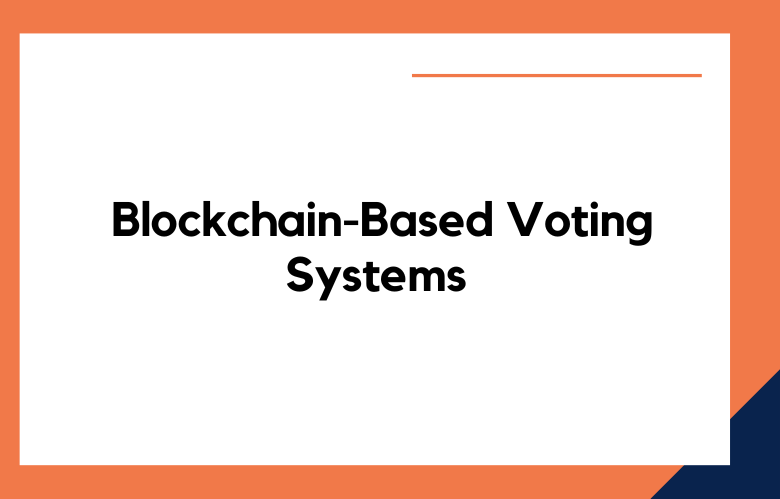Blockchain-based voting systems have the potential to revolutionize the way political campaigns are conducted by providing a secure and transparent platform for voting that could increase voter participation and confidence in the electoral process.
Blockchain-based voting systems have emerged as a promising solution for improving political campaigns’ security, transparency, and integrity. By leveraging blockchain technology’s decentralized and distributed nature, these systems can provide a secure and tamper-proof platform for conducting elections while increasing voter participation and building trust in the electoral process.
Blockchain-Based Voting Systems for Political Campaigns
One of the critical advantages of blockchain-based voting systems is their ability to prevent fraud and manipulation. By using a distributed ledger to record and verify votes, these systems make it virtually impossible for malicious actors to alter or manipulate the election results. This can help to build trust in the electoral process and increase voter confidence in the legitimacy of the election outcome.
Blockchain technology is a decentralized, distributed ledger that records transactions across many computers so that any involved record cannot be altered retroactively without altering all subsequent blocks. This makes it an ideal platform for secure and transparent voting systems.
Here are some ways in which blockchain-based voting systems could impact political campaigns:
Increased Voter Participation: By providing a secure and convenient platform for voting, blockchain-based voting systems could increase voter participation and engagement, particularly among traditionally underrepresented groups in the political process.
Increased Transparency: Blockchain-based voting systems could provide a more transparent and verifiable voting process, enabling voters to track their votes and ensuring that all votes are counted accurately.
Reduced Voter Fraud: Blockchain technology could help to prevent voter fraud by providing a secure and transparent platform for voting that is resistant to tampering and manipulation.
Increased Voter Confidence: By providing a more secure and transparent voting process, blockchain-based voting systems could increase voter confidence in the electoral process, leading to greater participation and engagement.
Reduced Costs: By providing a more efficient and cost-effective solution, blockchain-based voting systems could reduce the costs associated with traditional voting methods, such as paper ballots and polling places.
Overall, blockchain-based voting systems have the potential to significantly impact political campaigns by increasing voter participation, transparency, and confidence in the electoral process while reducing costs and preventing voter fraud.
Unlocking Democracy: Blockchain-Based Voting Systems for Political Campaigns
In recent years, the integrity of political campaigns and elections has come under increasing scrutiny, ranging from voter fraud and manipulation to low voter turnout and lack of transparency. Many are turning to blockchain-based voting systems as a potential solution to address these challenges.
Blockchain technology can potentially transform the way elections are conducted by providing a secure, transparent, and tamper-proof platform for conducting elections. Using a distributed ledger to record and verify votes, blockchain-based voting systems can prevent fraud and manipulation while increasing voter participation and building trust in the electoral process.
Revolutionizing Electoral Systems: The Power of Blockchain-Based Voting
Blockchain-based voting has the potential to unlock new levels of democracy by providing a secure, transparent, and accessible platform for conducting elections.
By leveraging blockchain technology’s decentralized and distributed nature, these systems can help address many of the challenges and limitations of traditional voting systems, including security, transparency, and accessibility.
One of the critical advantages of blockchain-based voting is its ability to provide a secure and tamper-proof platform for conducting elections. By using a distributed ledger to record and verify votes, these systems make it virtually impossible for malicious actors to alter or manipulate the election results. This can help to build trust in the electoral process and increase voter confidence in the legitimacy of the election outcome.
Building Trust: Blockchain-Enabled Voting Systems in Political Campaigns
Trust is a critical component of any political campaign, and the voting process is no exception. In recent years, concerns about the security and transparency of traditional voting systems have led to a growing interest in blockchain-enabled voting systems as a potential solution.
Blockchain technology can transform the voting process by providing a secure, transparent, and tamper-proof platform for elections. Using a distributed ledger to record and verify votes can help increase voter participation, build trust in the electoral process, and reduce the costs associated with traditional voting methods.
Secure, Transparent, and Efficient: Blockchain Voting for Political Campaigns
Political campaigns are complex and dynamic processes requiring careful planning, strategic decision-making, and effective communication. Many organizations are turning to blockchain technology as a potential solution to increase transparency, security, and efficiency in political campaigns.
Blockchain voting systems offer a secure, transparent, and efficient platform for conducting elections and increasing voter participation. By using a distributed ledger to record and verify votes, these systems make it virtually impossible for malicious actors to alter or manipulate the election results, increasing voter confidence in the legitimacy of the election outcome.
In addition to increasing security and transparency, blockchain voting systems can increase voter participation by making it easier and more convenient for voters to participate in the electoral process.
By enabling voters to cast their ballots online or through a mobile app, these systems can make voting more accessible to a broader range of voters, particularly those who may have difficulty voting in person due to geographic, physical, or other constraints.
Digital Democracy: Harnessing Blockchain for Political Campaigns
The world of political campaigning is undergoing a dramatic transformation, driven by the rise of digital technologies and the increasing importance of data-driven strategies. Among the most promising of these technologies is blockchain, which has the potential to revolutionize the way campaigns are conducted and increase transparency, security, and efficiency in the electoral process.
Blockchain is a distributed ledger technology that enables secure and transparent transactions without intermediaries. By providing a decentralized platform for recording and verifying transactions, blockchain can increase transparency and accountability in political campaigns while reducing the risk of fraud and manipulation.
The Future of Voting: Blockchain-Powered Political Campaign Systems
The future of voting is poised to undergo a revolutionary transformation driven by the emergence of blockchain technology and its potential to increase transparency, security, and efficiency in the electoral process. By leveraging blockchain’s decentralized and distributed nature, political campaigns can create a secure and transparent platform for conducting elections, increasing trust and accountability in the democratic process.
One of the critical advantages of blockchain-powered voting systems is their ability to increase transparency in campaign financing. Using a blockchain-based platform to record and verify campaign contributions, campaigns can provide voters with a clear and transparent view of who is funding their efforts, increasing trust and accountability in the electoral process.
Breaking Barriers: Blockchain-Based Voting for Political Campaigns
Political campaigns are a crucial aspect of any democratic society, and voting is the foundation of this process. However, traditional voting methods have faced numerous challenges, including barriers to participation, concerns about election integrity, and lack of transparency.
Blockchain technology has the potential to address these challenges by providing a secure, transparent, and decentralized platform for conducting elections. By leveraging the power of blockchain, political campaigns can create a more inclusive and accessible voting process that breaks down barriers to participation and increases trust in the electoral process.
Conclusion:
Blockchain-based voting systems promise to revolutionize political campaigns by providing a secure, transparent, and tamper-proof platform for conducting elections. By leveraging blockchain technology’s decentralized and distributed nature, these systems can help increase voter participation, reduce fraud, and build trust in the electoral process.
Despite the challenges and limitations of blockchain-based voting systems, there is a growing recognition of their potential to transform political campaigns and improve the democratic process. As the technology continues to evolve, blockchain-based voting systems will likely play an increasingly important role in shaping the future of political campaigns.
Call: +91 9848321284
Email: [email protected]
Blockchain-Based Voting Systems for Political Campaigns: FAQs
What Is A Blockchain-Based Voting System?
A blockchain-based voting system uses decentralized ledger technology to record votes securely and transparently, making tampering with or altering the results nearly impossible.
How Does Blockchain Ensure Vote Security?
Blockchain secures votes by encrypting each ballot and storing it on a tamper-proof distributed ledger, ensuring end-to-end integrity throughout the voting process.
Can Blockchain Prevent Election Fraud?
Yes, blockchain can reduce fraud by eliminating centralized vulnerabilities, providing transparent audit trails, and securely validating voter identities.
Why Are Political Campaigns Exploring Blockchain Voting?
Political campaigns see blockchain as a way to enhance voter trust, increase participation, and reduce manipulation risks through verified and transparent systems.
How Does Voter Identity Verification Work In Blockchain Systems?
Digital identity systems or biometric verification methods ensure that each registered voter can cast only one authenticated vote on the blockchain.
Is Blockchain Voting Suitable For Remote Or Diaspora Voting?
Yes, blockchain voting is ideal for remote or diaspora voters. It allows them to vote securely from anywhere with a verifiable digital identity.
What Role Does Encryption Play In Blockchain Voting?
Encryption ensures that individual votes are anonymized and securely stored, protecting voter privacy while maintaining transparency in results.
Can Blockchain Voting Be Integrated With Existing Electoral Systems?
Yes, hybrid models can be implemented where blockchain systems complement traditional voting processes, particularly for recording and result validation.
What Are The Challenges In Adopting Blockchain Voting At Scale?
Challenges include infrastructure readiness, digital literacy, regulatory approval, cybersecurity risks, and concerns about technological accessibility for all voters.
How Transparent Are Blockchain-Based Elections?
Highly transparent—each vote is recorded immutably, and stakeholders can audit the results without compromising voter confidentiality.
Are There Any Countries Already Using Blockchain Voting?
Countries like Estonia and pilot projects in Switzerland, India, and the United States have tested or implemented blockchain voting mechanisms.
What Are The Cost Implications Of Blockchain Voting Systems?
While initial implementation can be expensive, long-term costs may decrease due to automation, reduced personnel, and fewer instances of fraud or recounts.
Can Voter Anonymity Be Maintained In Blockchain Voting?
Absolutely. Modern blockchain protocols ensure votes are verifiable without revealing the voter’s identity, ensuring both privacy and security.
How Can Blockchain Help In Post-Election Audits?
Blockchain’s immutable ledger provides a transparent and verifiable trail of all votes, making recounts and audits faster, more accurate, and tamper-proof.
What Is The Role Of Smart Contracts In Blockchain Voting?
Smart contracts automate various parts of the voting process—like vote validation, counting, and final result declaration—without human interference.
Can Blockchain Voting Improve Voter Turnout?
Potentially yes. By making voting more accessible, especially online and for remote voters, blockchain could increase engagement and turnout.
How Quickly Can Votes Be Counted In Blockchain Elections?
Blockchain systems allow real-time or near-real-time vote tallying, drastically reducing result announcement delays.
What Regulatory Hurdles Exist For Blockchain-Based Elections?
Laws often lag behind technology. Electoral commissions must approve blockchain frameworks, and legal standards must address data privacy and digital identity.
Are There Risks Of Cyberattacks In Blockchain Voting?
While blockchain is resilient to tampering, risks like phishing, endpoint hacking, or identity theft still exist and require strong cybersecurity measures.
How Can Political Leaders Advocate For Blockchain Voting?
To ensure secure implementation, they can promote pilot programs, work with regulatory bodies, educate voters, and build partnerships with technology providers.











